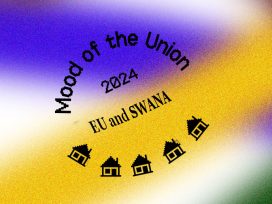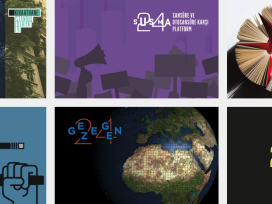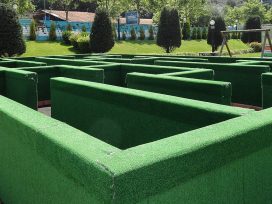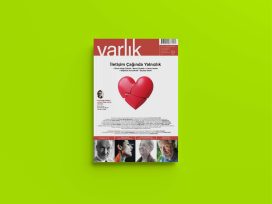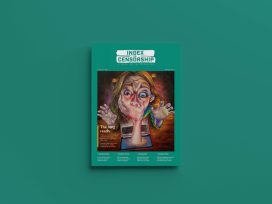As our readers will know, Varlik is one of two Turkish partners of Eurozine, a network of European cultural journals with over eighty members. We have been attending almost all meetings of the network since 1995, and in 2005 we (along with Cogito) hosted the network conference in Istanbul. The purpose of Eurozine is to enable and strengthen intercultural dialogue. Striving to serve this purpose our magazine offers its readers speeches delivered at the annual meetings or interesting articles that have appeared in other journals in the network, and some articles from Varlik are published on the Eurozine website as well as in other partners journals.
As a long-standing Eurozine partner, we wanted our independent editor Sila Okur to attend the 22nd Eurozine meeting held last May in Vilnius, the capital of Lithuania – and the European Culture Capital of 2009. However, we decided not to send any representative to Vilnius. We were simply fed up with the obstructive and dishonourable demands of the Lithuanian Embassy in Ankara that completely disregarded the official letters of invitation (which displays an attitude of pertinent to all former Soviet satellite states – new members of the EU – towards “peripheral” countries not members of the Union). Coming from an EU member who has chosen not to (or has not able to) establish a diplomatic mission in Istanbul, a city of 14 million and the 2010 European Capital of Culture, the absurd demands were just too much. In addition to a list of “required documents” consisting of 10 to 12 items they included that “the applicant does not have a recent Schengen visa; he must apply personally” or “he must submit additional documents proving that he has the income to sustain himself during his stay”. (Let’s not be too hard on the Lithuanians; similar demands come from the consulate of our “historical friend and ally” Germany, a country where more than 3 million of our citizens live – but Germany at least have a diplomatic mission in the commercial, industrial and cultural centre of Turkey; in Istanbul!)
Possibly, the Lithuanians were not familiar of with any other place in the world than their own country (one twelfth the size of Turkey) so they simply could not grasp what it would mean for a person working in Istanbul to travel 450 kilometres to Ankara and spend a day (possibly more) there only to obtain a three-day visa. Furthermore, they probably thought it was best to demand additional proof alongside all the bank account summaries and official corporate documents the applicant – a man of culture and commerce who was invited to a European Capital of Culture and resided in another European Capital of Culture – had already submitted to avoid that he, unable to find anything to eat in Vilnius, would go into a fit of hunger and demand assistance from the government of Lithuania or even Brussels; and all this despite the fact that all expenses of his three-day journey were already covered by the hosts, which included the City of Vilnius and the office of the President of Lithuania…
Our friend sent an email saying roughly, “enough is enough”. Varlik informed the network of this tragicomic experience which is similar to what we have experienced ever since we started to attend the network meetings in different European cities. We recommended them not to invite their members to any other meeting in Europe unless they could guarantee that such invitees would not be subject to a host of meaningless and disparaging acts. We would also recommend other real or legal persons encountering such difficulties in Turkey to adopt a similar attitude towards their hosts in Turkey. Such acts will never draw to a close as long as we consent to them.
Do not think for a moment that this conduct is reserved for citizens of Turkey holding regular passports; when you read the Byelorussian Nelly Bekus-Goncharova’s article “Living in visa territory” in this issue (reprinted from Eurozine), you might as well thank the powers that be for your good fortune.
We are presenting all these stories in this issue not just for adding to the inexhaustible fund of “visa adventures” that has already bored everyone to death; we also wish to create a realistic perspective for the so-called “dialogue of civilizations” and similar discourses that prove to be all too popular these days.
Since the European Coal and Steel Community – established in 1951, after two world wars, in order to enhance economic cooperation and to prevent competition for economic resources to spawn new wars – its successor the European Union is now aiming at full integration of Europe in every aspect – including culture.
Had the European project remained limited to a single market, then the today’s grand “unity, prosperity, intercultural dialogue” claims of the European Union would look pretentious at best. After all, you do not inaugurate a shopping center with Beethoven’s ninth symphony (more befitting a civic center), or engrave Schiller’s “An die Freude” on its wall.
As the accession criteria make manifest, the European Union makes grand claims: Human rights, tolerance, multiculturalism, equality, and the rule of law are among the common values that are to be shared. On the other hand, the extent to which these claims are reflected in real life (ultimately of more concern to all of us), are dubious at best, which can be seen in the thousands of stories of which we have related but a couple here. In bolder terms, the overall ineptness, lack of vision and hypocrisy of EU leaders (there is scarcely any difference between them and the leaders of non-EU nations) pass on to the acquis communautaire and to the community bureaucracy who tend to be crippled by this plethora of volumes, making those sublime values stay on paper, confined to the limits of the lines written by the famous German poet to inspire the ninth symphony.
Imagine: The capital of an eastern European nation that lived under Soviet reign for over forty years and has been a member of the European Union for four years has been chosen to be the European Capital of Culture 2009. It is hosting the annual meeting of the European Network of Cultural Journals, of which one of the country’s most important magazines is a member, under the auspices of the president. The invitational letter to the conference speaks of discussions “in a shared space transcending national boundaries.” The event is hosted by the city council and by the president. You invite one of the five oldest cultural journals in Europe, from a city that is the next European Capital of Culture. A journal that hosted the same meeting four years ago. The accommodation and subsistence costs as well as transfer expenses of the three-day event are covered by the hosts. Travel costs are covered by the invited journal. The hosts send an official invitation to the name of the representative, who is ultimately a man of culture. Additionally, they inform the embassy to which the representative will apply. Then, the mini-scandal recounted above occurs.
The 22nd European Meeting of Cultural Journals was held. The opening speech was delivered by the President of the Republic of Lithuania. This was followed by the inaugural address of the Editor-in-Chief and president of Eurozine, Mr Carl Henrik Fredriksson. A thought-provoking section of this speech is given below:
[…]
Before I go on to thank some of the people who have made this conference possible I want to take this opportunity to tell you two stories. Two European stories.
Once upon a time, in Budapest, a young man, an engaged intellectual, was going about his business, working hard to understand and change the world through words. He was the editor of a cultural journal. One day he was invited to an international conference. Eager to discuss literature and art, culture and politics with his colleagues in the West, he was thrilled about the invitation: a real chance for some fresh air.
However, the young man couldn’t go. Instead he had to find a new hiding place for his journals’ stock of paper. The authorities were on to the old one, and without paper they would not be able to publish their next issue.
So, he had to postpone the dialogue with his colleagues in the West. For how long? Well, the story doesn’t tell.
One year? Two years? Five years?
Once upon a time, in Istanbul, a young man, an engaged intellectual, was going about his business, working hard to understand and change the world through words. He was the editor of a cultural journal. One day he was invited to an international conference. A well-read man, fluent in English and eager to discuss literature and art, culture and politics with anyone he could get hold of, he jumped at the chance to get to know like-minded colleagues from all over Europe.
But he couldn’t go. He tried for months to get a visa to the country where the conference was going to take place, but every time that he supplied the documents that the officials at the embassy had asked for, they would come up with something new. Yet another document. Yet another 450 kilometres trip from the young man’s home to the Embassy. In the end it got too much.
So, he had to postpone the dialogue with his European colleagues. For how long? Well, the story doesn’t tell.
One year? Two years? Five years?
These are true stories. More than 20 years separate them in time.
The first took place in 1985, when the circle of editors that later turned into the Eurozine network wanted to invite at least some participants from Eastern Europe to one of their yearly meetings.
The second story is from 2009, when the same network – our network – invited our esteemed friends and colleagues from the long-standing Eurozine partner journal Varlik from Turkey to take part in this very conference that we are now opening.
Two years ago, in my inaugural speech at the Eurozine conference in Sibiu, I said that we have come a long way since 1983, when the first European Meeting of Cultural Journals took place in Bossey in Switzerland. The topic of the meeting in Sibiu was normality and I was very proud to be able to point to the fact that at least since the mid-nineties – long before any of the recent “enlargements” – participants from Eastern and Southern Europe no longer appear as anomalies at these meetings, but as perfectly normal people. Or at least as normal as editors, writers and intellectuals can be.
Today, I am sad to say, I am not so sure. Red tape and contingent visa regulations are being used to pursue old strategies of differentiation and are not seldom the manifest symptoms of prejudices and old and new hierarchies. Not only the financial crisis has made it necessary to bring up again the old concept of the East-West divide.
However – Mr President, ladies and gentlemen – the conclusion cannot be one of resignation. Stories like these – and I could have told you many more – make our endeavour all the more important.
[…]
Carl Henrik Fredriksson, Inaugural address at the 22nd European Meeting of Cultural Journals, Vilnius, Presidential Palace, 8 May 2009
